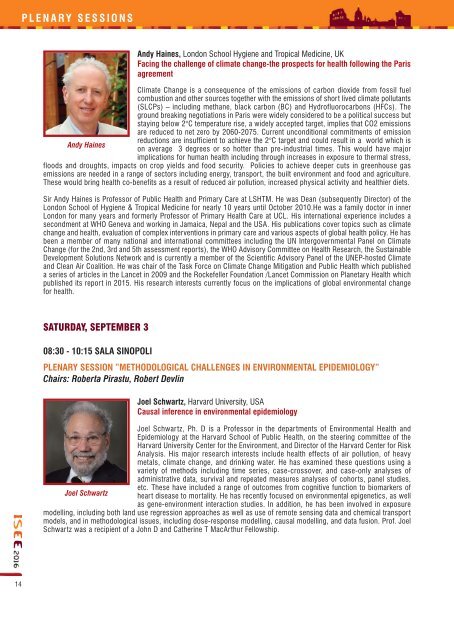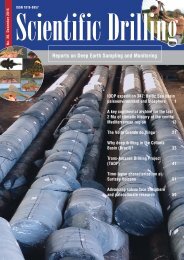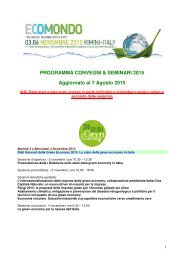Rome Italy
program-bookISEE2016
program-bookISEE2016
You also want an ePaper? Increase the reach of your titles
YUMPU automatically turns print PDFs into web optimized ePapers that Google loves.
PLENARY SESSIONS<br />
Andy Haines, London School Hygiene and Tropical Medicine, UK<br />
Facing the challenge of climate change-the prospects for health following the Paris<br />
agreement<br />
Climate Change is a consequence of the emissions of carbon dioxide from fossil fuel<br />
combustion and other sources together with the emissions of short lived climate pollutants<br />
(SLCPs) – including methane, black carbon (BC) and Hydrofluorocarbons (HFCs). The<br />
ground breaking negotiations in Paris were widely considered to be a political success but<br />
staying below 2°C temperature rise, a widely accepted target, implies that CO2 emissions<br />
are reduced to net zero by 2060-2075. Current unconditional commitments of emission<br />
reductions are insufficient to achieve the 2°C target and could result in a world which is<br />
Andy Haines<br />
on average 3 degrees or so hotter than pre-industrial times. This would have major<br />
implications for human health including through increases in exposure to thermal stress,<br />
floods and droughts, impacts on crop yields and food security. Policies to achieve deeper cuts in greenhouse gas<br />
emissions are needed in a range of sectors including energy, transport, the built environment and food and agriculture.<br />
These would bring health co-benefits as a result of reduced air pollution, increased physical activity and healthier diets.<br />
Sir Andy Haines is Professor of Public Health and Primary Care at LSHTM. He was Dean (subsequently Director) of the<br />
London School of Hygiene & Tropical Medicine for nearly 10 years until October 2010.He was a family doctor in inner<br />
London for many years and formerly Professor of Primary Health Care at UCL. His international experience includes a<br />
secondment at WHO Geneva and working in Jamaica, Nepal and the USA. His publications cover topics such as climate<br />
change and health, evaluation of complex interventions in primary care and various aspects of global health policy. He has<br />
been a member of many national and international committees including the UN Intergovernmental Panel on Climate<br />
Change (for the 2nd, 3rd and 5th assessment reports), the WHO Advisory Committee on Health Research, the Sustainable<br />
Development Solutions Network and is currently a member of the Scientific Advisory Panel of the UNEP-hosted Climate<br />
and Clean Air Coalition. He was chair of the Task Force on Climate Change Mitigation and Public Health which published<br />
a series of articles in the Lancet in 2009 and the Rockefeller Foundation /Lancet Commission on Planetary Health which<br />
published its report in 2015. His research interests currently focus on the implications of global environmental change<br />
for health.<br />
SATURDAY, SEPTEMBER 3<br />
08:30 - 10:15 SALA SINOPOLI<br />
PLENARY SESSION ”METHODOLOGICAL CHALLENGES IN ENVIRONMENTAL EPIDEMIOLOGY”<br />
Chairs: Roberta Pirastu, Robert Devlin<br />
Joel Schwartz, Harvard University, USA<br />
Causal inference in environmental epidemiology<br />
Joel Schwartz, Ph. D is a Professor in the departments of Environmental Health and<br />
Epidemiology at the Harvard School of Public Health, on the steering committee of the<br />
Harvard University Center for the Environment, and Director of the Harvard Center for Risk<br />
Analysis. His major research interests include health effects of air pollution, of heavy<br />
metals, climate change, and drinking water. He has examined these questions using a<br />
variety of methods including time series, case-crossover, and case-only analyses of<br />
administrative data, survival and repeated measures analyses of cohorts, panel studies,<br />
etc. These have included a range of outcomes from cognitive function to biomarkers of<br />
Joel Schwartz heart disease to mortality. He has recently focused on environmental epigenetics, as well<br />
as gene-environment interaction studies. In addition, he has been involved in exposure<br />
modelling, including both land use regression approaches as well as use of remote sensing data and chemical transport<br />
models, and in methodological issues, including dose-response modelling, causal modelling, and data fusion. Prof. Joel<br />
Schwartz was a recipient of a John D and Catherine T MacArthur Fellowship.<br />
14





